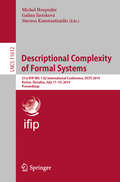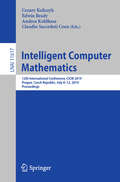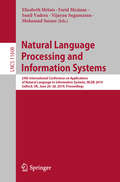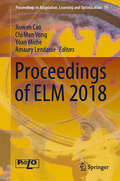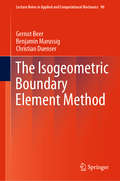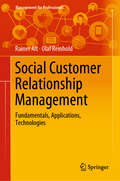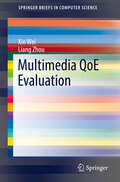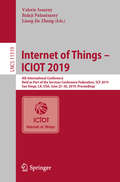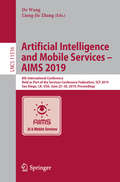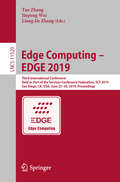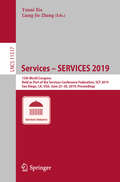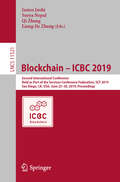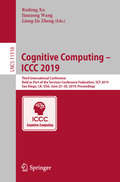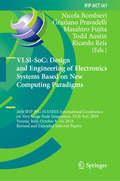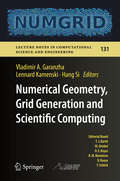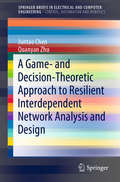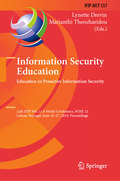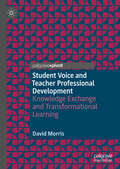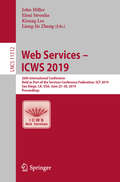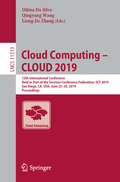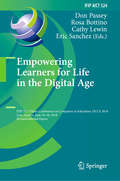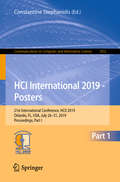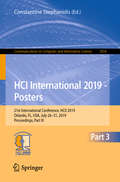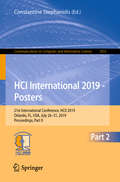- Table View
- List View
Descriptional Complexity of Formal Systems: 21st IFIP WG 1.02 International Conference, DCFS 2019, Košice, Slovakia, July 17–19, 2019, Proceedings (Lecture Notes in Computer Science #11612)
by Michal Hospodár Galina Jirásková Stavros KonstantinidisThis book constitutes the proceedings of the 21st International Conference on Descriptional Complexity of Format Systems, DCFS 2019, held in Košice, Slovakia, in July 2019. The 18 full papers presented in this volume were carefully reviewed and selected from 25 submissions. The book also contains 4 invited talks. They deal with all aspects of descriptional complexity and costs of description of objects in various computational models, such as Turing machines, pushdown automata, finite automata, grammars, and others.
Intelligent Computer Mathematics: 12th International Conference, CICM 2019, Prague, Czech Republic, July 8–12, 2019, Proceedings (Lecture Notes in Computer Science #11617)
by Cezary Kaliszyk Edwin Brady Andrea Kohlhase Claudio Sacerdoti CoenThis book constitutes the refereed proceedings of the 12th International Conference on Intelligent Computer Mathematics, CICM 2019, held in Prague, Czech Republic, in July 2019. The 19 full papers presented were carefully reviewed and selected from a total of 41 submissions. The papers focus on digital and computational solutions which are becoming the prevalent means for the generation, communication, processing, storage and curation of mathematical information. Separate communities have developed to investigate and build computer based systems for computer algebra, automated deduction, and mathematical publishing as well as novel user interfaces. While all of these systems excel in their own right, their integration can lead to synergies offering significant added value.
Natural Language Processing and Information Systems: 24th International Conference on Applications of Natural Language to Information Systems, NLDB 2019, Salford, UK, June 26–28, 2019, Proceedings (Lecture Notes in Computer Science #11608)
by Elisabeth Métais Farid Meziane Sunil Vadera Vijayan Sugumaran Mohamad SaraeeThis book constitutes the refereed proceedings of the 24th International Conference on Applications of Natural Language to Information Systems, NLDB 2019, held in Salford, UK, in June 2019. The 21 full papers and 16 short papers were carefully reviewed and selected from 75 submissions. The papers are organized in the following topical sections: argumentation mining and applications; deep learning, neural languages and NLP; social media and web analytics; question answering; corpus analysis; semantic web, open linked data, and ontologies; natural language in conceptual modeling; natural language and ubiquitous computing; and big data and business intelligence.
Proceedings of ELM 2018 (Proceedings in Adaptation, Learning and Optimization #11)
by Jiuwen Cao Chi Man Vong Yoan Miche Amaury LendasseThis book contains some selected papers from the International Conference on Extreme Learning Machine 2018, which was held in Singapore, November 21–23, 2018. This conference provided a forum for academics, researchers and engineers to share and exchange R&D experience on both theoretical studies and practical applications of the ELM technique and brain learning.Extreme Learning Machines (ELM) aims to enable pervasive learning and pervasive intelligence. As advocated by ELM theories, it is exciting to see the convergence of machine learning and biological learning from the long-term point of view. ELM may be one of the fundamental “learning particles” filling the gaps between machine learning and biological learning (of which activation functions are even unknown). ELM represents a suite of (machine and biological) learning techniques in which hidden neurons need not be tuned: inherited from their ancestors or randomly generated. ELM learning theories show that effective learning algorithms can be derived based on randomly generated hidden neurons (biological neurons, artificial neurons, wavelets, Fourier series, etc.) as long as they are nonlinear piecewise continuous, independent of training data and application environments. Increasingly, evidence from neuroscience suggests that similar principles apply in biological learning systems. ELM theories and algorithms argue that “random hidden neurons” capture an essential aspect of biological learning mechanisms as well as the intuitive sense that the efficiency of biological learning need not rely on computing power of neurons. ELM theories thus hint at possible reasons why the brain is more intelligent and effective than current computers. The main theme of ELM2018 is Hierarchical ELM, AI for IoT, Synergy of Machine Learning and Biological Learning.This book covers theories, algorithms and applications of ELM. It gives readers a glance at the most recent advances of ELM.
The Isogeometric Boundary Element Method (Lecture Notes in Applied and Computational Mechanics #90)
by Gernot Beer Benjamin Marussig Christian DuenserThis book discusses the introduction of isogeometric technology to the boundary element method (BEM) in order to establish an improved link between simulation and computer aided design (CAD) that does not require mesh generation. In the isogeometric BEM, non-uniform rational B-splines replace the Lagrange polynomials used in conventional BEM. This may seem a trivial exercise, but if implemented rigorously, it has profound implications for the programming, resulting in software that is extremely user friendly and efficient. The BEM is ideally suited for linking with CAD, as both rely on the definition of objects by boundary representation. The book shows how the isogeometric philosophy can be implemented and how its benefits can be maximised with a minimum of user effort. Using several examples, ranging from potential problems to elasticity, it demonstrates that the isogeometric approach results in a drastic reduction in the number of unknowns and an increase in the quality of the results. In some cases even exact solutions without refinement are possible. The book also presents a number of practical applications, demonstrating that the development is not only of academic interest. It then elegantly addresses heterogeneous and non-linear problems using isogeometric concepts, and tests them on several examples, including a severely non-linear problem in viscous flow. The book makes a significant contribution towards a seamless integration of CAD and simulation, which eliminates the need for tedious mesh generation and provides high-quality results with minimum user intervention and computing.
Social Customer Relationship Management: Fundamentals, Applications, Technologies (Management for Professionals)
by Rainer Alt Olaf ReinholdSocial media has received considerable attention, and many potential benefits, as well as concerns, are now being discussed. This book explores how social media can successfully support business processes in marketing, sales and service in the context of customer relationship management (CRM). It presents the fundamentals of Social CRM and shows how small and large companies alike have implemented it.In turn, the book presents analytic and operational software tools that offer features for enhancing and streamlining interactions with customers. The book concludes with an overview of essential design areas that businesses need to bear in mind when introducing social media into their CRM strategies. In this regard, it also points out key success factors, limitations, and data protection aspects.
Multimedia QoE Evaluation (SpringerBriefs in Computer Science)
by Xin Wei Liang ZhouThis SpringerBrief discusses the most recent research in the field of multimedia QoE evaluation, with a focus on how to evaluate subjective multimedia QoE problems from objective techniques. Specifically, this SpringerBrief starts from a comprehensive overview of multimedia QoE definition, its influencing factors, traditional modeling and prediction methods. Subsequently, the authors introduce the procedure of multimedia service data collection, preprocessing and feature extractions. Then, describe several proposed multimedia QoE modeling and prediction techniques in details. Finally, the authors illustrate how to implement and demonstrate multimedia QoE evaluation in the big data platform. This SpringerBrief provides readers with a clear picture on how to make full use of multimedia service data to realize multimedia QoE evaluation. With the exponential growth of the Internet technologies, multimedia services become immensely popular. Users can enjoy multimedia services from operators or content providers by TV, computers and mobile devices. User experience is important for network operators and multimedia content providers. Traditional QoS (quality of service) can not entirely and accurately describe user experience. It is natural to research the quality of multimedia service from the users’ perspective, defined as multimedia quality of experience (QoE). However, multimedia QoE evaluation is difficult, because user experience is abstract and subjective, hard to quantify and measure. Moreover, the explosion of multimedia service and emergence of big data, all call for a new and better understanding of multimedia QoE.This SpringerBrief targets advanced-level students, professors and researchers studying and working in the fields of multimedia communications and information processing. Professionals, industry managers, and government research employees working in these same fields will also benefit from this SpringerBrief.
Internet of Things – ICIOT 2019: 4th International Conference, Held as Part of the Services Conference Federation, SCF 2019, San Diego, CA, USA, June 25–30, 2019, Proceedings (Lecture Notes in Computer Science #11519)
by Valerie Issarny Balaji Palanisamy Liang-Jie ZhangThis book constitutes the proceedings of the International Conference on Internet of Things, ICIOT 2019, held as part of SCF 2019, in San Diego, CA, USA, in June 2019. The 8 full and 3 short papers presented in this volume were carefully reviewed and selected from 16 submissions. With the rapid advancements of mobile Internet, cloud computing and big data, device-centric traditional Internet of Things (IoT) is now moving into a new era which is termed as Internet of Things Services (IOTS). In this era, sensors and other types of sensing devices, wired and wireless networks, platforms and tools, data processing/visualization/analysis and integration engines, and other components of traditional IoT are interconnected through innovative services to realize the value of connected things, people, and virtual Internet spaces.
Segmentation and Separation of Overlapped Latent Fingerprints: Algorithms, Techniques, and Datasets (SpringerBriefs in Computer Science)
by Branka Stojanović Oge Marques Aleksandar NeškovićThis Springerbrief presents an overview of problems and technologies behind segmentation and separation of overlapped latent fingerprints, which are two fundamental steps in the context of fingerprint matching systems. It addresses five main aspects: (1) the need for overlapped latent fingerprint segmentation and separation in the context of fingerprint verification systems; (2) the different datasets available for research on overlapped latent fingerprints; (3) selected algorithms and techniques for segmentation of overlapped latent fingerprints; (4) selected algorithms and techniques for separation of overlapped latent fingerprints; and (5) the use of deep learning techniques for segmentation and separation of overlapped latent fingerprints.By offering a structured overview of the most important approaches currently available, putting them in perspective, and suggesting numerous resources for further exploration, this book gives its readers a clear path for learning new topics and engaging in related research. Written from a technical perspective, and yet using language and terminology accessible to non-experts, it describes the technologies, introduces relevant datasets, highlights the most important research results in each area, and outlines the most challenging open research questions.This Springerbrief targets researchers, professionals and advanced-level students studying and working in computer science, who are interested in the field of fingerprint matching and biometrics. Readers who want to deepen their understanding of specific topics will find more than one hundred references to additional sources of related information.
Artificial Intelligence and Mobile Services – AIMS 2019: 8th International Conference, Held as Part of the Services Conference Federation, SCF 2019, San Diego, CA, USA, June 25–30, 2019, Proceedings (Lecture Notes in Computer Science #11516)
by De Wang Liang-Jie ZhangThis book constitutes the proceedings of the 8th International Conference on Artificial Intelligence and Mobile Services, AIMS 2019, held as part of SCF 2019, in San Diego, CA, USA, in June 2019. The 12 full papers and one short paper presented were carefully reviewed and selected from 29 submissions. The papers cover different aspects of mobile services from business management to computing systems, algorithms and applications. They promote technological technological innovations in research and development of mobile services, including, but not limited to, wireless and sensor networks, mobile and wearable computing, mobile enterprise and eCommerce, ubiquitous collaborative and social services, machine-to-machine and Internet-of-things, clouds, cyber-physical integration, and big data analytics for mobility-enabled services.
Edge Computing – EDGE 2019: Third International Conference, Held as Part of the Services Conference Federation, SCF 2019, San Diego, CA, USA, June 25–30, 2019, Proceedings (Lecture Notes in Computer Science #11520)
by Tao Zhang Jinpeng Wei Liang-Jie ZhangThis book constitutes the proceedings of the Third International Conference on Edge Computing, EDGE 2019, held in San Diego, CA, USA, in June 2019. The 5 full papers and 1 short paper presented in this volume were carefully reviewed and selected from 14 submissions. The contributions deal with the latest fundamental advances in the state of the art and practice of edge computing, identifying emerging research topics and defining the future of edge computing.
Services – SERVICES 2019: 15th World Congress, Held as Part of the Services Conference Federation, SCF 2019, San Diego, CA, USA, June 25–30, 2019, Proceedings (Lecture Notes in Computer Science #11517)
by Yunni Xia Liang-Jie ZhangThis book constitutes the refereed proceedings of the 15th World Congress on Services, SERVICES 2019, held as part of the Services Conference Federation, SCF 2019, in San Diego, USA, in June 2019.The 11 full papers and 2 short papers presented were carefully reviewed and selected from 14 submissions. The papers cover topics in the field of software engineering foundations and applications with a focus on novel approaches for engineering requirements, design and architectures, testing, maintenance and evolution, model-driven development, software processes, metrics, quality assurance and new software economics models, search-based software engineering, benefiting day-to-day services sectors and derived through experiences, with appreciation to scale, pragmatism, transparency, compliance and/or dependability.
Blockchain – ICBC 2019: Second International Conference, Held as Part of the Services Conference Federation, SCF 2019, San Diego, CA, USA, June 25–30, 2019, Proceedings (Lecture Notes in Computer Science #11521)
by James Joshi Surya Nepal Qi Zhang Liang-Jie ZhangThis book constitutes the refereed proceedings of the Second International Conference on Blockchain, ICBC 2019, held as part of the Services Conference Federation, SCF 2019, in San Diego, CA, USA, in June 2019. The 13 full papers and 2 short papers presented were carefully reviewed and selected from 29 submissions. The papers cover a wide range of topics in blockchain technologies, platforms, solutions and business models such as new blockchain architecture, platform constructions, blockchain development and blockchain services technologies, as well as standards, and blockchain services innovation lifecycle including enterprise modeling, business consulting, solution creation, services orchestration, services optimization, services management, services marketing, business process integration and management.
Cognitive Computing – ICCC 2019: Third International Conference, Held as Part of the Services Conference Federation, SCF 2019, San Diego, CA, USA, June 25–30, 2019, Proceedings (Lecture Notes in Computer Science #11518)
by Ruifeng Xu Jianzong Wang Liang-Jie ZhangThis book constitutes the proceedings of the International Conference on Cognitive Computing, ICCC 2019, held as part of SCF 2019, in San Diego, CA, USA, in June 2019. The 14 full and 3 short papers presented in this volume were carefully reviewed and selected from 42 submissions. The papers cover all aspects of Sensing Intelligence (SIJ as a Service (SlaaS). Cognitive Computing is a sensing-driven computing (SDC) scheme that explores and integrates intelligence from all types of senses in various scenarios and solution contexts
VLSI-SoC: 26th IFIP WG 10.5/IEEE International Conference on Very Large Scale Integration, VLSI-SoC 2018, Verona, Italy, October 8–10, 2018, Revised and Extended Selected Papers (IFIP Advances in Information and Communication Technology #561)
by Ricardo Reis Masahiro Fujita Nicola Bombieri Graziano Pravadelli Todd AustinThis book contains extended and revised versions of the best papers presented at the 26th IFIP WG 10.5/IEEE International Conference on Very Large Scale Integration, VLSI-SoC 2018, held in Verona, Italy, in October 2018. The 13 full papers included in this volume were carefully reviewed and selected from the 27 papers (out of 106 submissions) presented at the conference. The papers discuss the latest academic and industrial results and developments as well as future trends in the field of System-on-Chip (SoC) design, considering the challenges of nano-scale, state-of-the-art and emerging manufacturing technologies. In particular they address cutting-edge research fields like heterogeneous, neuromorphic and brain-inspired, biologically-inspired, approximate computing systems.
Numerical Geometry, Grid Generation and Scientific Computing: Proceedings of the 9th International Conference, NUMGRID 2018 / Voronoi 150, Celebrating the 150th Anniversary of G.F. Voronoi, Moscow, Russia, December 2018 (Lecture Notes in Computational Science and Engineering #131)
by Vladimir A. Garanzha Lennard Kamenski Hang SiThe focus of these conference proceedings is on research, development, and applications in the fields of numerical geometry, scientific computing and numerical simulation, particularly in mesh generation and related problems. In addition, this year’s special focus is on Voronoi diagrams and their applications, celebrating the 150th birthday of G.F. Voronoi. In terms of content, the book strikes a balance between engineering algorithms and mathematical foundations. It presents an overview of recent advances in numerical geometry, grid generation and adaptation in terms of mathematical foundations, algorithm and software development and applications. The specific topics covered include: quasi-conformal and quasi-isometric mappings, hyperelastic deformations, multidimensional generalisations of the equidistribution principle, discrete differential geometry, spatial and metric encodings, Voronoi-Delaunay theory for tilings and partitions, duality in mathematical programming and numerical geometry, mesh-based optimisation and optimal control methods. Further aspects examined include iterative solvers for variational problems and algorithm and software development. The applications of the methods discussed are multidisciplinary and include problems from mathematics, physics, biology, chemistry, material science, and engineering.
A Game- and Decision-Theoretic Approach to Resilient Interdependent Network Analysis and Design (SpringerBriefs in Electrical and Computer Engineering)
by Juntao Chen Quanyan ZhuThis brief introduces game- and decision-theoretical techniques for the analysis and design of resilient interdependent networks. It unites game and decision theory with network science to lay a system-theoretical foundation for understanding the resiliency of interdependent and heterogeneous network systems. The authors pay particular attention to critical infrastructure systems, such as electric power, water, transportation, and communications. They discuss how infrastructure networks are becoming increasingly interconnected as the integration of Internet of Things devices, and how a single-point failure in one network can propagate to other infrastructures, creating an enormous social and economic impact. The specific topics in the book include: · static and dynamic meta-network resilience game analysis and design; · optimal control of interdependent epidemics spreading over complex networks; and · applications to secure and resilient design of critical infrastructures. These topics are supported by up-to-date summaries of the authors’ recent research findings. The authors then discuss the future challenges and directions in the analysis and design of interdependent networks and explain the role of multi-disciplinary research has in computer science, engineering, public policy, and social sciences fields of study. The brief introduces new application areas in mathematics, economics, and system and control theory, and will be of interest to researchers and practitioners looking for new approaches to assess and mitigate risks in their systems and enhance their network resilience. A Game- and Decision-Theoretic Approach to Resilient Interdependent Network Analysis and Design also has self-contained chapters, which allows for multiple levels of reading by anyone with an interest in game and decision theory and network science.
Information Security Education. Education in Proactive Information Security: 12th IFIP WG 11.8 World Conference, WISE 12, Lisbon, Portugal, June 25–27, 2019, Proceedings (IFIP Advances in Information and Communication Technology #557)
by Lynette Drevin Marianthi TheocharidouThis book constitutes the refereed proceedings of the 11th IFIP WG 11.8 World Conference on Information Security Education, WISE 12, held in Lisbon, Portugal, in June 2019.The 12 revised full papers presented were carefully reviewed and selected from 26 submissions. The papers are organized in the following topical sections: innovation in curricula; training; applications and cryptography; and organizational aspects.
Student Voice and Teacher Professional Development: Knowledge Exchange and Transformational Learning
by David MorrisThis book explores the role of students’ involvement in teacher professional development. Building upon a research study whereby pupils instruct their teachers in the use of Information and Communication Technology (ICT), the author argues that using student voice in this way can result in transformational learning for all those involved. The author presents the processes and experiences of pupils taking on the role of educators as well as the experiences of the teachers receiving such professional development from their students. In doing so, he promotes the innovative use of a student voice initiative to support teaching and learning, with the overarching purpose of improving and transforming teacher-pupil relationships. This book will be of interest and value to students and scholars of pupil voice, teacher professional development and transformational learning.
Web Services – ICWS 2019: 26th International Conference, Held as Part of the Services Conference Federation, SCF 2019, San Diego, CA, USA, June 25–30, 2019, Proceedings (Lecture Notes in Computer Science #11512)
by John Miller Eleni Stroulia Kisung Lee Liang-Jie ZhangThis volume constitutes the proceedings of the 26th International Conference on Web Services, ICWS 2019, held as part of SCF 2019 in San Diego, CA, USA in June 2019. The 11 full papers together with 1 short paper published in this volume were carefully reviewed and selected from 31 submissions. ICWS has been a prime international forum for both researchers and industry practitioners to exchange the latest fundamental advances in the state of the art and practice of Web-based services, to identify emerging research topics, and to define the future of Web-based services. Topics include Internet services modeling, discovery, composition, testing, adaptation, delivery, as well as standards.
Cloud Computing – CLOUD 2019: 12th International Conference, Held as Part of the Services Conference Federation, SCF 2019, San Diego, CA, USA, June 25–30, 2019, Proceedings (Lecture Notes in Computer Science #11513)
by Qingyang Wang Liang-Jie Zhang Dilma Da SilvaThis volume constitutes the proceedings of the 12th International Conference on Cloud Computing, CLOUD 2019, held as part of the Services Conference Federation, SCF 2019, in San Diego, CA, USA, in June 2019. The 24 full papers were carefully reviewed and selected from 53 submissions. CLOUD has been a prime international forum for both researchers and industry practitioners to exchange the latest fundamental advances in the state of the art and practice of cloud computing, to identify emerging research topics, and to define the future of cloud computing. All topics regarding cloud computing align with the theme of CLOUD.
Empowering Learners for Life in the Digital Age: IFIP TC 3 Open Conference on Computers in Education, OCCE 2018, Linz, Austria, June 24–28, 2018, Revised Selected Papers (IFIP Advances in Information and Communication Technology #524)
by Don Passey Rosa Bottino Cathy Lewin Eric SanchezThis book constitutes the refereed post-conference proceedings of the IFIP TC 3 Open Conference on Computers in Education, OCCE 2018, held in Linz, Austria, in June 2018.The 24 revised full papers and 3 short papers included in this volume were carefully reviewed and selected from 63 submissions during two rounds of reviewing. The papers discuss key emerging topics and evolving practices in the area of educational computing research. They are organized in the following topical sections: computational thinking; programming and computer science education; teachers’ education and professional development; games-based learning and gamification; learning in specific and disciplinary contexts; learning in social networking environments; and self-assessment, e-assessment and e-examinations.
HCI International 2019 - Posters: 21st International Conference, HCII 2019, Orlando, FL, USA, July 26–31, 2019, Proceedings, Part I (Communications in Computer and Information Science #1032)
by Constantine StephanidisThe three-volume set CCIS 1032, CCIS 1033, and CCIS 1034 contains the extended abstracts of the posters presented during the 21st International Conference on Human-Computer Interaction, HCII 2019, which took place in Orlando, Florida, in July 2019.The total of 1274 papers and 209 posters included in the 35 HCII 2019 proceedings volumes was carefully reviewed and selected from 5029 submissions.The 208 papers presented in these three volumes are organized in topical sections as follows: Part I: design, development and evaluation methods and technique; multimodal Interaction; security and trust; accessibility and universal access; design and user experience case studies. Part II:interacting with games; human robot interaction; AI and machine learning in HCI; physiological measuring; object, motion and activity recognition; virtual and augmented reality; intelligent interactive environments. Part III: new trends in social media; HCI in business; learning technologies; HCI in transport and autonomous driving; HCI for health and well-being.
HCI International 2019 - Posters: 21st International Conference, HCII 2019, Orlando, FL, USA, July 26–31, 2019, Proceedings, Part III (Communications in Computer and Information Science #1034)
by Constantine StephanidisThe three-volume set CCIS 1032, CCIS 1033, and CCIS 1034 contains the extended abstracts of the posters presented during the 21st International Conference on Human-Computer Interaction, HCII 2019, which took place in Orlando, Florida, in July 2019.The total of 1274 papers and 209 posters included in the 35 HCII 2019 proceedings volumes was carefully reviewed and selected from 5029 submissions.The 208 papers presented in these three volumes are organized in topical sections as follows: Part I: design, development and evaluation methods and technique; multimodal Interaction; security and trust; accessibility and universal access; design and user experience case studies. Part II:interacting with games; human robot interaction; AI and machine learning in HCI; physiological measuring; object, motion and activity recognition; virtual and augmented reality; intelligent interactive environments. Part III: new trends in social media; HCI in business; learning technologies; HCI in transport and autonomous driving; HCI for health and well-being.
HCI International 2019 - Posters: 21st International Conference, HCII 2019, Orlando, FL, USA, July 26–31, 2019, Proceedings, Part II (Communications in Computer and Information Science #1033)
by Constantine StephanidisThe three-volume set CCIS 1032, CCIS 1033, and CCIS 1034 contains the extended abstracts of the posters presented during the 21st International Conference on Human-Computer Interaction, HCII 2019, which took place in Orlando, Florida, in July 2019.The total of 1274 papers and 209 posters included in the 35 HCII 2019 proceedings volumes was carefully reviewed and selected from 5029 submissions.The 208 papers presented in these three volumes are organized in topical sections as follows: Part I: design, development and evaluation methods and technique; multimodal Interaction; security and trust; accessibility and universal access; design and user experience case studies. Part II:interacting with games; human robot interaction; AI and machine learning in HCI; physiological measuring; object, motion and activity recognition; virtual and augmented reality; intelligent interactive environments. Part III: new trends in social media; HCI in business; learning technologies; HCI in transport and autonomous driving; HCI for health and well-being.
